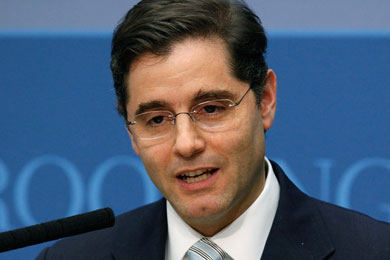
Julius Genachowski, FCC Chairman will deliver the keynote address at the Consumer Electronics Show, (1/7/11) starting at 1:30 PT. in Las Vegas. The Chairman has been a proponent of net neutrality and actively working toward a more efficient use of radio wave spectrum. His remarks were released in advance. TV and terrestrial radio, which currently hold large chunks of wireless spectrum are carefully watching to see if/how the FCC’s vision may effect their industries going forward.
“The consumer electronic industry is going wireless, and the future success of this wide-ranging industry and others depends on whether our government acts quickly to unleash more spectrum—the oxygen that sustains our mobile devices,” Genachowski says.
“To seize the opportunities of our mobile future, we need to tackle the challenges of our invisible infrastructure. We need to free up more spectrum. If we do, we can drive billions of dollars in new private investment, fueling world-leading innovations, creating millions of new jobs, and enabling endless new products and services that can help improve the lives of all Americans. If we don’t tackle the spectrum challenge, network congestion will grow, and consumer frustration will grow with it. We’ll put our country’s economic competitiveness at risk, and squander the opportunity to lead the world in mobile. That’s why unleashing spectrum to support mobile innovation is at the top of the FCC’s 2011 agenda.”
The Chairman cited advances in the past year in the market for tablets, eBooks and the “app economy” as proof of how swiftly these markets can evolve.
 “Thanks to Skype, Facebook, Twitter and many others, mobile has become an incredible platform for connecting friends and families, kids on one end of the country to grandparents on the other,” Genachowski’s remarks continue. “Mobile broadband can empower people not only in 21st century economies, but can promote 21st century democracy. We’ve seen this around the world. Here’s the issue: All of these wireless innovations require an invisible infrastructure that is up to the task. They require something we can’t see—spectrum, the airwaves—the signals that beam from towers and quietly carry digital information—data, voice, video—until they light up those devices we increasingly rely on.
“Thanks to Skype, Facebook, Twitter and many others, mobile has become an incredible platform for connecting friends and families, kids on one end of the country to grandparents on the other,” Genachowski’s remarks continue. “Mobile broadband can empower people not only in 21st century economies, but can promote 21st century democracy. We’ve seen this around the world. Here’s the issue: All of these wireless innovations require an invisible infrastructure that is up to the task. They require something we can’t see—spectrum, the airwaves—the signals that beam from towers and quietly carry digital information—data, voice, video—until they light up those devices we increasingly rely on.
“This invisible infrastructure is the backbone of a growing percentage of our economy and our lives. And whether or not most Americans know the physics of spectrum, they know what it feels like to have a slow connection or a call dropped. This coming spectrum crunch is not just a real issue for the future of gadgets, it’s a vital strategic issue for the future of our economy and job creation, our global competitiveness, and our quality of life. Failure to tackle the spectrum challenge could have disastrous consequences.”
Calling the current U.S. spectrum policies “outdated,” the FCC Chairman outlined some of the general changes he’d like to see take place including incentive auctions to redirect spectrum use more efficiently.
“We need to make more spectrum available for mobile broadband,” stated Genachowski. “So we are eliminating unnecessary restrictions on use of spectrum—all toward our goal for freeing up 500 megahertz of spectrum for mobile broadband, almost double what is currently available.
Since the Digital TV transition, some broadcasters are making effective use of the capabilities of their spectrum, but some are not. For those who are not, their spectrum could be put to higher use for other purposes. What we need is a mechanism to enable market forces to unleash the value of that spectrum for broadband use, and we believe that incentive auctions are that mechanism. It’s time to take the necessary steps to ensure that spectrum will be the great enabler of mobile innovation in the 21st century, not a chokepoint. I believe incentive auctions are a test of whether the U.S. can make the right strategic choices in a complex and fast-moving digital economy.”
The Chairman also noted that, “…just this week, the Consumer Electronics Association, the Information Technology Industry Council, the Semiconductor Industry Association and the Telecommunication Industry Association wrote a joint-letter to Congressional leaders calling on Congress to ‘swiftly pass legislation allowing the FCC to conduct voluntary incentive auctions.'”

About the Author
David M. Ross has been covering Nashville's music industry for over 25 years. dross@musicrow.comView Author Profile



